Quick Links
Facilities
CISP’s strategic position within the university allows us to place and keep the latest equipment to meet nearly any testing need. The wide array of laboratories across the university provides processing, characterization, and testing equipment to meet internal research needs, as well as the testing needs of private industry and other academic institutions. The below desicriptions answer some common questions we receive about our most requested tests. Please contact us for more information about these and other tests that are available.
Thermal Analysis | Physical Properties | Imaging | Mechanical Properties | Furnace and Sintering
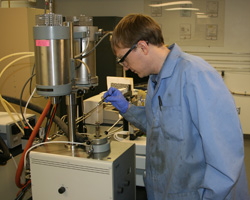
Differential Scanning Calorimeter (DSC) and Thermal Gravimetric Analysis (TGA)
- Model: Netzsch STA 409
- Air, nitrogen, argon, and hydrogen up to 1400°C
- FTIR available (contact for details)
- Can be used to monitor phase changes, chemical reactions, oxidizations, polymer burnout and more
- Results: DSC⁄TGA curve versus temperature graphically and in electronic form
^ Top
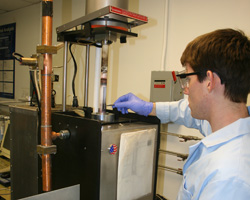
- Manufacturer: Anter
- Hydrogen, nitrogen, and argon can be used as the atmosphere up to 1450°C
- Determines the coefficient of thermal expansion of solids or shrinkage during powder sintering
- Results: Raw data of linear change in height with temperature and graphical representation
^ Top
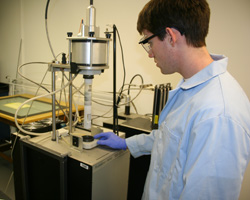
Thermal Conductivity ⁄ Diffusivity
- Model: Anter Laser Flash 5000
- Argon, nitrogen, and hydrogen up to 1500°C
- Sample size: 12.55–12.70 mm diameter disk with height between 0.5–3.0 mm depending on the expected thermal diffusivity
- Standard test: up to 4 temperatures can be investigated; request quote for additional temperatures
- Results: Thermal diffusivity at specific temperature and specific heat if the sample density is known
^ Top
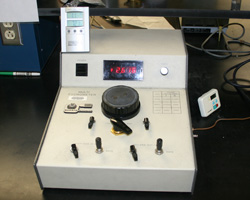
- Determines "skeletal" density utilizing helium
- Can be used on powders, fibers, porous materials and solids
- Sample holder cylinders:
- Micro — 15 mm diameter and 25 mm height
- Small — 24 mm diameter and 38 mm height
- Large — 49 mm diameter and 72 mm height
- Results: Density in g⁄cc
^ Top
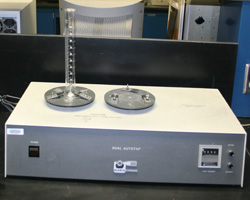
- The density of powder after the powder has been "tapped" or compacted under its own weight
- Results: Density in g⁄cc
^ Top
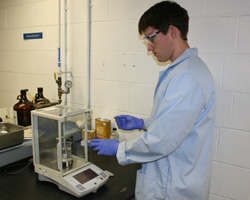
- The density of a powder including the space between particles
- Results: Density in g⁄cc
^ Top
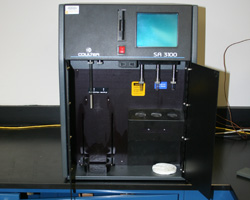
- Model: Coutler SA 3100
- Powder and object sample holder
- Nitrogen, as both cryogen and adsorbent
- Most accurate for total surface areas above 10 m²
- Results: BET surface area (m²⁄g) and correlation coefficient (how well the data fits the BET equation)
^ Top
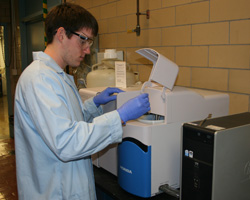
- Model: Horiba LA–920
- Laser diffraction technique
- Particles from .010 µm to 3,000 µm
- Wet dispersion
- Need powders’ refractive index for best results
- Results: Particle size distribution based on volumne
^ Top
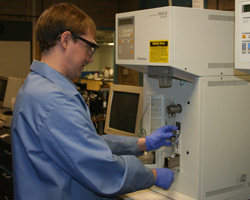
- Pascal high and low pressure unit
- Measurable pore diameter range 116–0.0036 µm
- 0.2–3 grams needed depending on the porosity and sample type
- Results: Pore size distribution
^ Top
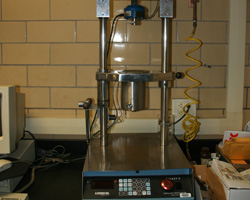
Capillary Rheometer
- Measures the flow properties of a polymer–metal compound
- Results: Specific flow properties depending on test method utilized
^ Top
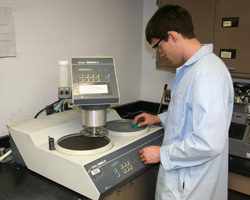
Metallography (mounting and polishing)
- Mount in epoxy resin and polish
- A wide variety of polishing methodology can be followed
- Contact to discuss specific sample issues
- Results: Polished samples and⁄or images
^ Top
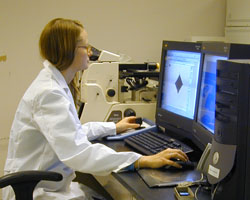
- Low magnification microscope for objects
- High magnification microscope (50x–1,000x) for polished samples
- Results: Images
^ Top
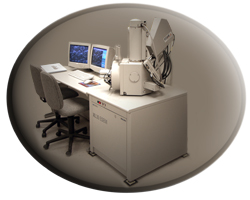
Scanning Electron Microscope (SEM)
- Model: Philips XL30 ESEM
- Secondary electron imaging
- Backscatter imaging
- Environmental mode for low conductivity samples
- Elemental identification (EDAX)
- Other SEM's available upon request
- Results: SEM images and EDAX data if requested
^ Top
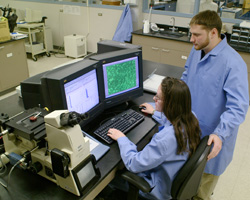
- Clemex image analysis and microscope control system
- Grain size analysis
- Contact for specific image analysis needs
- Results: Depends on analysis needs
^ Top
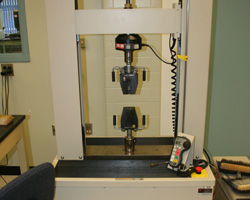
Tensile Testing or Three–Point Bend
- Various machines available
- Contact to discuss specific sample requirements
- Results: Load displacement curves and measured values as desired
^ Top
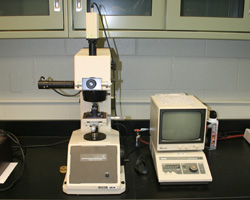
- Various testers available including micro hardness
- Knoop, Rockwell B, and Rockwell C tips are available
- Results: Hardness per sample
^ Top
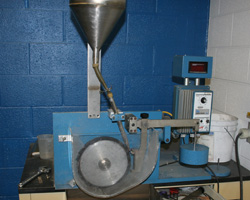
- Standard: ASTM G–65
- Sand is flowed between a rubber wheel and sample
- Comparative test and is best utilized to compare different materials’ performance under the same testing conditions
- Results: A report detailing the volume loss of the samples
^ Top

Field Assisted Sintering Technologies (FAST) or Spark Plasma Sintering (SPS)
- Manufacturer: FCT Systeme GmbH
- Temperatures up to 2100°C
- Pressures up to 80 MPa
- Independent control of pressure and temperature
- Can perform hydrogen reduction within chamber
- Please contact for more information
^ Top
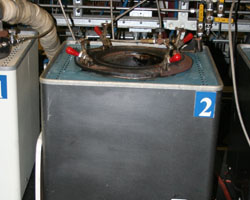
- Vacuum, nitrogen, air, argon, and hydrogen up to 1150°C
- Small steel walled furnace
- Sample chamber is cylindrical with a 7” diameter and 8” of usable height
- Results: No data to report
^ Top
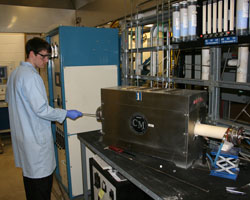
- Nitrogen, argon, and hydrogen up to 1500°C
- sample size depends on geometry of sample or powder holder (max height is 1.25 inches)
- Results: No data to report
^ Top
